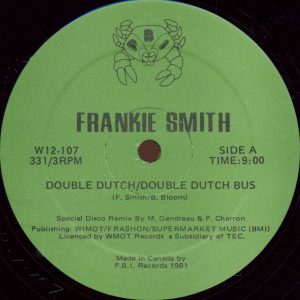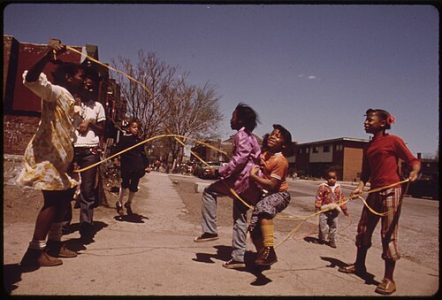#19: Double Dutch Bus by Frankie Smith
City: Montreal, PQ
Radio Station: CKGM
Peak Month: August 1981
Peak Position in Montreal ~ #1
Peak position in Vancouver ~ did not chart
Peak Position on Billboard Hot 100 ~ #30
Peak Position on Dutch Singles Top 100 ~ #7
YouTube: “Double Dutch Bus”
Lyrics: “Double Dutch Bus”
Franklyn “Frankie” Leon Smith was born in Philadelphia in 1940. As a child, he taught himself to play piano. He studied a minor in music at a college in Tennessee. One of his uncles was comedian Pigmeat Markham. In 1973, Frankie Smith and Bill Bloom wrote a song called “Double Dutch” after a game of skipping rope popular across America. However, the single was not a hit. Through the 70s, Frankie Smith wrote songs recorded by Melba Moore, Barbara Mason, Archie Bell & The Drells, Billy Paul, and others.
In 1980, Smith noticed that skipping rope was having a revival, and he convinced WMOT Records to record an updated version of the song.

“Double Dutch Bus” was cowritten by Frankie Smith and Bill Bloom. Living in Philadelphia, Bill Bloom performed with Duke Ellington and His Orchestra. Bloom went on to work as a staff writer and producer at Philadelphia International Records and then at WMOT Records. He went on to teach at several schools in Philadelphia. After 2001, he was ordained as an interfaith minister, and became the minstrel of music at a church in suburban Philadelphia.
Bloom told a blogger in 2005 about their recording in the WMOT studio. “Initially what they did was give us the end of someone else’s studio time, so they told us we could go in at the end of their session using some of their recorded tracks. The only thing we could do initially was record a drum track: Fat Larry was the drummer in the band and all he did was record a drum track. The following week we went back, I took that track home and added some keyboards to it, so the next week we added keyboards and we were supposed to use some base and guitar, and the following week, I think the third week, we added the bass to it. What we would do, we would take what we recorded home and listen to it. Frankie came up with some words and I came up with some musical ideas. The fourth week the record sounded good enough that the company let us record the song. We had never done a song like that before, we sort of made it up as we went along. We ended up with one long tape: one side we called Double Dutch and the other side we called Double Dutch Bus because it had a horn in the song. Initially, Frankie and I liked the Double Dutch song. The slang part of it at that time–kids in Philadelphia were using that slang–and it’s really just a contemporary pig latin. What we decided to do, is we brought in some of Frankie’s neighbors, and we told them what we wanted them to say, and they spoke the slang, and then we figured out rhythmically how to insert it into the song.”
“Bip, bop, bam, alakazam,
But only if you’re grooving with the Double Dutch Man.”
In the lyrics, “Double Dutch Bus” introduced a pig-latin-like patois used by children as a secret code. It later served as inspiration for Snoop Dog, Jay-Z, and other rappers. Smith’s nonsensical slang inserted “iz” which was placed in the middle of a word (for example, the word “place” becomes “plizace”). Or the last letters of a word are replaced with “-izzle” (“sure” becomes shizzle). Rapper Melissa “Lissa” Jefferson changed her name to Lizzo when she was inspired by Jay-Z’s “Izzo (H.O.V.A)”.
Boy: “Hizzey, gizzirls! Y’izzall, hizzave t’mizzove izzout the wizzay sizzo the gizzuys can plizzay bizzasketbizzal.”
Girl: “Izzay whizzat? Nizzo yizzou izzaint.”
Boy: “Y’izzall bizzetter mizzove!”
Girl: “Izzay whizzat? Willze illzain’t millzovin'”
Boy: “Shillzu-gillza! Willzot nillzot billzaby?”
Girl: “Willze illzare plizzayin’ dizzouble dizzutch! Dizzouble dizzutch! Dizzouble dizzutch!….”
Double Dutch is a game in which two long jump ropes turning in opposite directions are jumped by one or more players jumping simultaneously. There is a lack of consensus regarding the early history of double Dutch, but it is said to have been traced back from Egypt, China, and even Europe, where various forms of skipping rope was quite common.
The sport’s immediate origins are a matter of debate, with some believing it was brought by Dutch settlers to America, and others claiming it emerged independently in the United States in the early 1900s. Nonetheless, it is widely acknowledged in the US that the sport reached its modern form in predominantly black urban areas of New York City, such as Harlem in the 1950s. On street corners, groups of girls congregated to display new tricks and repurposed clotheslines as ropes. While it had long been a popular street activity for African American girls in New York City, the modern sport of Double Dutch originated in the early 1970s with NYPD officers Ulysses Williams and David Walker, who formalized the rules for competition. The first official competition was held in 1974.

Girls playing Double Dutch outside Ida B. Wells homes in Chicago (1973)
The National Double Dutch League (NDDL) holds yearly camps and a Holiday Classic, in which teams from all over the world compete. NDDL was founded in the 1970’s by David A. Walker, who had been a police sergeant in Harlem. NDDL has been holding its annual Holiday Classic Official Double Dutch Sport & Fusion Freestyle Competition since 1992. Competitions in Double Dutch range from block parties to the world level. During the spring of 2009, Double Dutch became a varsity sport in New York City public high schools.
Playing Double Dutch involves at least three people: one or more jumping, and two turning the 3.5 m-long (11.5 ft) ropes (according to the American standard). A jumper usually performs tricks that may involve gymnastics or breakdance, also called breaking or b-boying/b-girling, and may also incorporate fancy foot movements. Based on the “WJRF Judging Handbook” 2019 edition, some of the key elements of Double Dutch include multiples, power, gymnastics, turner involvement, releases, switches and footwork.
BlackAmericaWeb reports, “The song was put out by Philadelphia label WMOT, which had a shady investor in Larry “Dr. Snow” Levin, a dentist who secretly sold cocaine on the side. His involvement with the label led to its shutdown in 1984, which was highlighted on the National Geographic documentary, “King of Coke: Living The High Life.”
The “Transpass” referred to by Smith in “Double Dutch Bus” is an actual monthly fare pass issued by the Southern Pennsylvania Transportation Authority (SEPTA). The narrator of “Double Dutch Bus” tells us they tell the driver of the Double Dutch Bus that they’re going to a “Double Dutch Affair.” Smith next intones “Fe, fi, of, fum,” recalling the 1734 English fairytale “Jack and the Beanstalk.” In the fairytale, a giant says “Fe, fi, fo, fum, I smell the blood of an Englishman, be he alive or be he dead, I’ll grind his bones to make my bread.” In order to get to the Double Dutch Affair, the narrator has to walk fifteen blocks, even though he has holes in his socks, and corns on his feet. Frankie Smith tells listeners to “put on your skates and grab your rope.”
“Double Dutch Bus” peaked at #1 in Montreal, San Diego, and Los Angeles, #2 in San Francisco, Boston, Corpus Christi (TX), Washington DC, and Houston, #4 in Burbank (CA), #5 in Sherbrooke (PQ), #7 in Honolulu, and #8 in Fort Lauderdale, and Windsor (ON). Internationally, the single peaked at #7 in the Netherlands and #19 in Belgium.
In 2003 Missy Elliott sampled “Double Dutch Bus” in her song “Gossip Folks”.
At the height of his popularity, Frankie Smith toured variously with Smokey Robinson, Rick James, the Sugarhill Gang, The Commodores, Kool & the Gang, and the Gap Band. “Double Dutch Bus” was the lead single from the album Children of Tomorrow. Smith released seven more singles into the mid-80s.
In 1983, Malcolm McLaren had a hit titled “Double Dutch” that reached #3 in the UK, #7 in Ireland, and #10 in New Zealand. It was also a Top 20 hit in Australia and West Germany.
In 2006, Frankie Smith released his second studio album title Frankie Smith and His World Wide Party Crew.
Smith died in his place of birth at the age of 79 in 2019.
July 9, 2025
Ray McGinnis
References:
Ed Hogan, “Frankie Smith Bio,” AllMusic.com.
“Black History and Double Dutch (Jumprope), a story,” African American Beginnings.
D.L. Chandler, “Little Known Black History Fact: Frankie Smith,” BlackAmericaWeb.com, March 14, 2019.
Elaine, “Special Interview with Bill Bloom,” Who Am I? Why Am I Here?, December 14, 2005.
Missy Elliott, “Gossip Folks“, 2003.
“Jack and the Beanstalk,” Wikipedia.org.
Jay-Z, “Izzo (H.O.V.A)” Baseline Studios, 2001.
Dick Clark, “Frankie Smith interview,” American Bandstand, 28, 1981.

CKGM 980-AM Montreal Top Ten | August 6, 1981

Leave a Reply